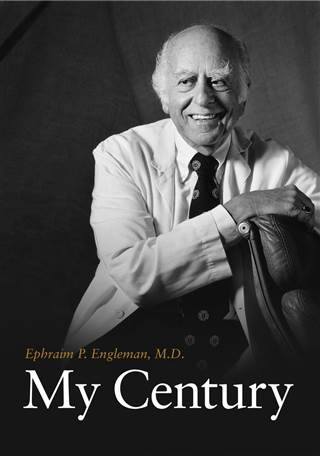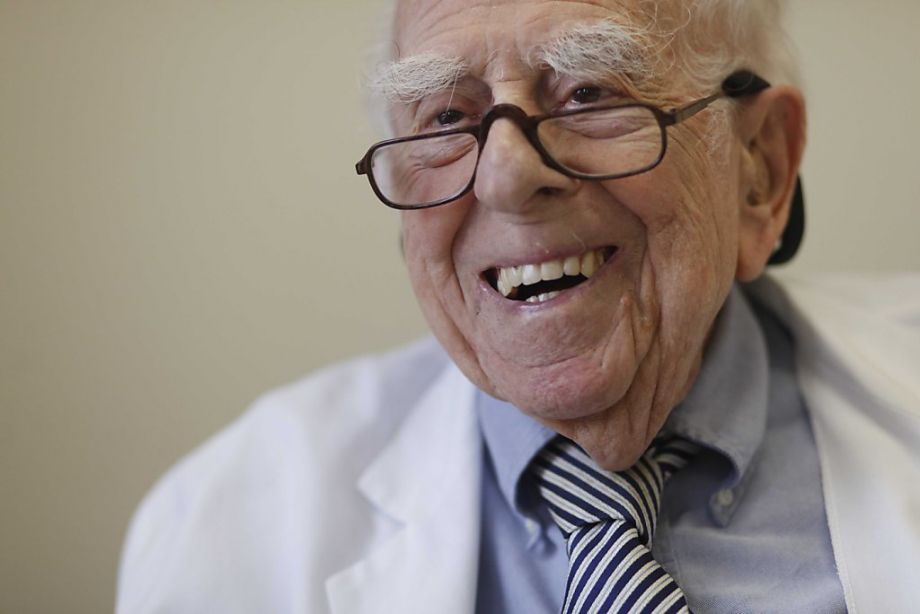Health News – Dr. Ephraim Engleman will celebrate his 104th birthday in March, but he’s too busy to dwell on reaching that remarkable age. Engleman, the director of the Rosalind Russell-Ephraim P. Engleman Rheumatology Research Center at UCSF, keeps looking forward, playing music (he’s a violinist who owns a Stradivarius and a Guarnieri, both from the 1700s) and enjoying time with his family (especially his loving wife of 73 years, Jean, who is 99).
In his downtime — of which there is little — he’s accepted more than a few honors, including the Presidential Gold Medal Award by the American College of Rheumatology, the  highest national honor in the field of rheumatology.
highest national honor in the field of rheumatology.
Although Engleman says he doesn’t have any secrets to longevity and aging well, we beg to differ. Engleman spoke with TODAY. com about what keeps him going and why he’ll never retire:
How tired are you of people asking how did you make it to 103 years old?
It’s a pain in the neck (laughs), but I imagine the question isn’t going to go away.
So you don’t think about your age until people remind you?
I do think about it now more than I ever did because people are pointing their fingers at me.. But I actually didn’t start thinking about it until I reached 100. That’s when people starting saying, “You’re 100 years old, that’s amazing.”
I guess it is amazing that I’m 103, but it’s important to remember that age — it’s just a number. I’m too busy to dwell on my age.
How important is it to stay busy?
I think it’s important, and I start my day, just like everyone else who is working. I get up about 7:30 or 8: 00 a.m., take a shower and I have breakfast at my home in San Mateo. I go into work three days a week in San Francisco. I don’t see many patients anymore, but I still have major administrative duties as director of our research center. Then I come home, have some dinner, and spend time with my gorgeous wife, and then I play the violin. I’m a musical nut. I play almost every night, for at least 30 to 45 minutes. And then once a week, we have chamber music at my home. We’re the San Andreas Quartet. I think it’s important to remain engaged in life, and music and my work are ways to do that.
Has age changed you at all?
I don’t remember names that well, but actually I never remembered names that well, even when I was much younger. I do have back problems, which limits my mobility to short walks and I use a walker and a cane. I must say using a cane is a great way to get respect.
Do you miss being active?
I was never really physically active, and I think exercise is over-rated (laughs.) My exercise has always been limited to walks and playing my violin.
That’s reassuring since I’m not crazy about going to the gym. But every doctor says eat right and exercise and you’ll add years to your life.
Well, I’ve never subscribed to that much. I will tell you I have never smoked and rarely drank, maybe just a sip of wine at dinners. But I don’t believe that necessarily has helped me live to 103. I’ve never been one of those people who pay a lot of attention to nutrition. I’ve eaten what I’ve enjoyed all of my life.
For breakfast, that’s eggs and maybe some smoked salmon. For lunch I have a sandwich. I used to bring a bologna sandwich to work, and people would kid me all the time. For supper, I’ll just have some soup or chicken. And I like ice cream. Vanilla. It’s important to enjoy your life and enjoy what you eat.
So you’re not keeping secrets?
Oh no (laughs.) I wrote a book called “My Century” and all the proceeds go to our research program. In the book there is a chapter on tips for longevity, some are admittedly facetious.
What are some of those tips?
The first thing I would say to people is pick your parents, and you’ll get some good genes. But that’s not true in my case. My dad died in his sixties and my mom died in her seventies.
You also need to pick the right spouse and encourage sex. Enjoy your work or don’t do it, and under no circumstances should you retire voluntarily.
Exercise, only if you must. Avoid vitamins, organic foods, fish oils, and other so-called nutrients. Don’t bother with special diets. Be happy and be lucky.
Also, keep breathing. That’s absolutely critical to longevity.
How important do you think it is to stay socially engaged, no matter what age you are?
I can only speak for myself. My music and my work are very important, but I am also a member of a men’s social club dedicated to art and music. I still do a lot of writing for them, mostly shows. It’s very enjoyable, and it makes me happy, and that’s important no matter what your age.
As people age, they have a tendency to look backward. Do you do that?
Sometimes, probably more now than I ever did. But I also look forward, and I think that’s very important to what some people may call successful aging. I look forward to my work, and I love my family and my friends. But when I look back, it’s still amazing to me how things have changed in my field (rheumatology) and how people’s lives have improved.
What was it like back in the day treating people with arthritis, particularly rheumatoid arthritis?
Well, actually we didn’t treat osteoarthritis that well, either. We’d tell people with arthritis to rest, and we’d hand out a bunch of aspirin. But then along came cortisone, and it was pretty much of a miracle.
Doctors, of course, needed to learn how to prescribe properly, but it really was amazing for people.
Then, of course, there are the biologics now that can help many, many people with rheumatoid arthritis. It’s been incredible, but we still have so much to learn, which is why research is just so important.
Do you ever want to retire?
Oh no, absolutely not. As long as the university will have me, and as long as my brain is good, I’m going to keep on working. It’s just important to stay engaged, mentally active, whether you’re 30 or 103.
You have to look to tomorrow.
Joan Raymond, Today.com

